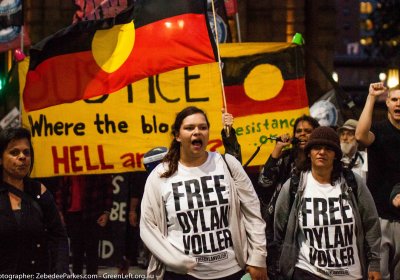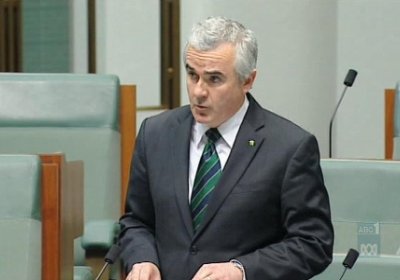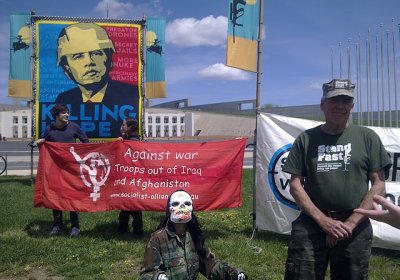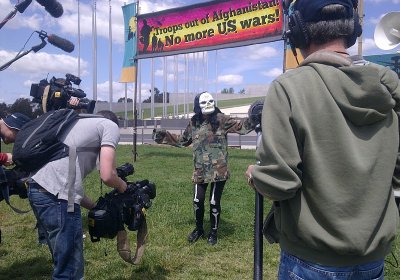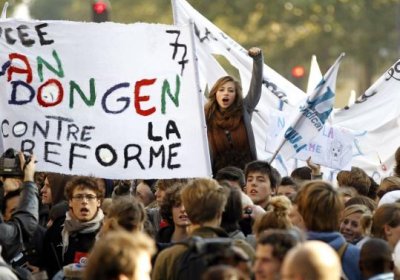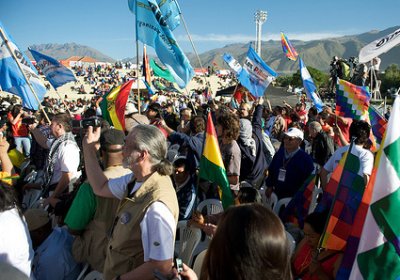The National Day of Action against Youth Incarceration on October 11 was marked by a protest rally and march, which also blocked a CBD intersection.
857
The second MP to speak in the House of Representatives debate on Australian military intervention in Afghanistan – a debate held nine years after the intervention began – was the newly elected independent Member for Denison (Tasmania) Andrew Wilkie.
On October 19, at exactly 3.30pm, the Lib-Lab politicians suddenly went from smirk to sombre as the Afghanistan “debate” finally started – nine years too late.
On October 19, Sydney Stop The War Coalition activist Marlene Obeid was dragged out of the parliamentary public gallery as Australia's Prime Minister Julia Gillard announced that Australian troops would be "engaged in Afghanistan at least for the rest of this decade".
No legally-binding agreement to cut greenhouse gas emissions will be made at this year’s big United Nations climate conference in Cancun, Mexico from November 29 to December 10. And that’s just the way the rich nations want it.
Few world leaders are even expected to turn up to the Cancun talks. For months, key players have tried to dampen down public hopes that the summit will mark a shift away from business as usual.
The British Guardian columnist George Monbiot wrote on September 20 that it was time for climate action campaigners to accept the UN process was dead.
BP abolishes safety ombudsman
“BP is disbanding the external safety ombudsman it set up after a fatal explosion at a company refinery in Texas in 2005 despite a growing number of concerns raised by the oil company’s employees.
“More than half the issues raised since the office was established in 2006 relate to BP’s operations in Alaska.
“BP said it would not extend the office’s tenure beyond June.
“The move comes less than a fortnight after the company announced it was setting up a new internal safety function, led by its head of safety and operations, Mark Bly.
The political situation in France is dominated by the struggle against the proposed reform of the pension system to raise the age of retirement, among other things. This reform is at the heart of French President Nicolas Sarkozy’s austerity policy.
Although presented as a demographic necessity, it is increasingly opposed by the public.
The struggle has been growing since the start of the mobilisations in May and the first day of action in June. Since the beginning of September, three days of strikes and demonstrations have brought out about 3 million people on each occasion.
Despite carefully-crafted appearances to the contrary, projects like the Extractive Industries Transparency Initiative (EITI) are no solution to the problems that confront the colonised “developing” world.
Endemic corruption, environmentally unsustainable development and spiralling income inequality are inseparable from the process of capitalist global expansion, which EITI and other corporate-funded front organisations only serve to legitimise.
Australia’s big banks would like you to think they care about climate change and the environment. But don’t believe them.
A new report by Greenpeace Australia has revealed the “big four” — Westpac, ANZ, Commonwealth and NAB — are investing billions of dollars in Australia’s dirty coal boom.
Burning coal for energy is Australia’s single biggest contributor to climate change, making more than a third of the country’s greenhouse gas pollution. Australia is also the world’s biggest coal exporter — and the export trade is growing fast.
Workers and students mobilised in their millions on October 12 in the fourth and largest day of action in the past month against laws that will reduce workers’ pension entitlements.
The protests and strikes came as the Senate passed aspects of the pension bill that will see an increase in the retirement age from 60 to 62 years of age and increase the period of time workers must work to receive a full pension.
The protests show growing polarisation over who should pay the price for the economic crisis in the lead up to national strikes on October 16 and 19.
The following call was issued by Canadian-based non-government organisations, community groups and individuals to join the growing global movement for climate justice. It calls for mobilising in the lead-up and during the United Nations climate summit in Cancun, Mexico, over November 27-December 10.
About 40 people attended the launch of a No New Coal campaign by Safe Climate Perth on October 10. The launch took place as part of the 350.org “global work party” — an international day of action involving more than 7000 events around the world.
As part of the campaign, activists aim to get 10,000 signatures in 10 weeks on a petition opposing new coal developments in Western Australian.
- Page 1
- Next page
